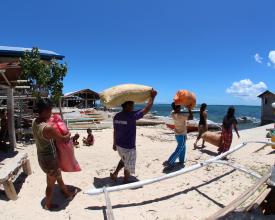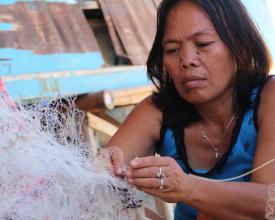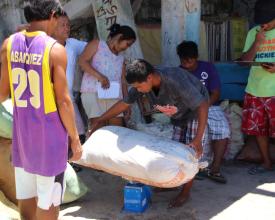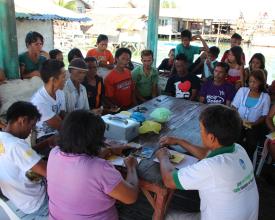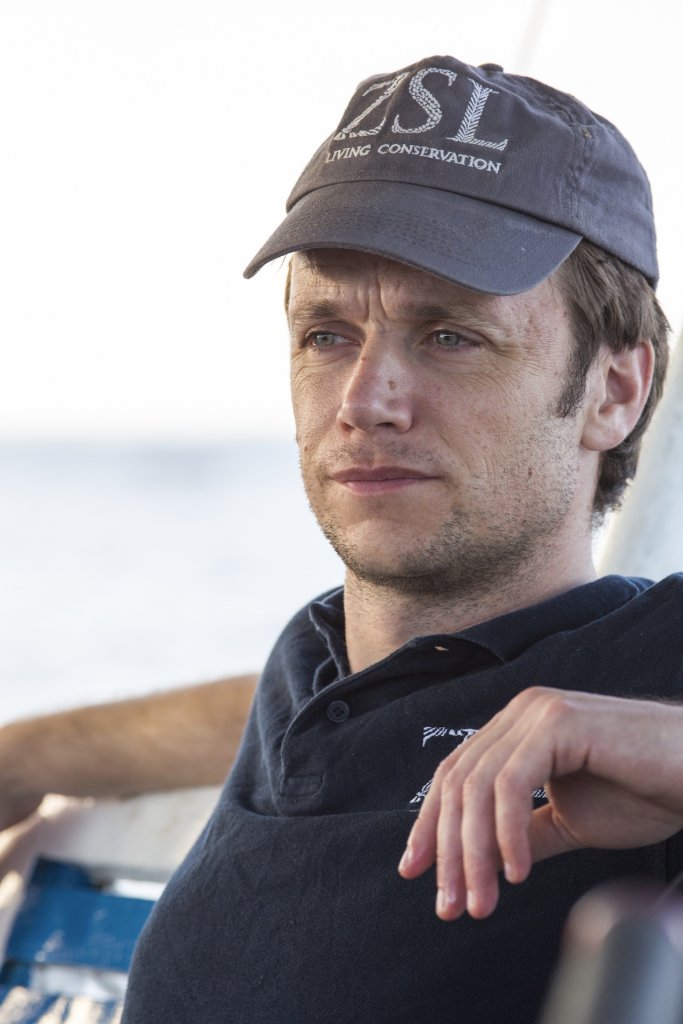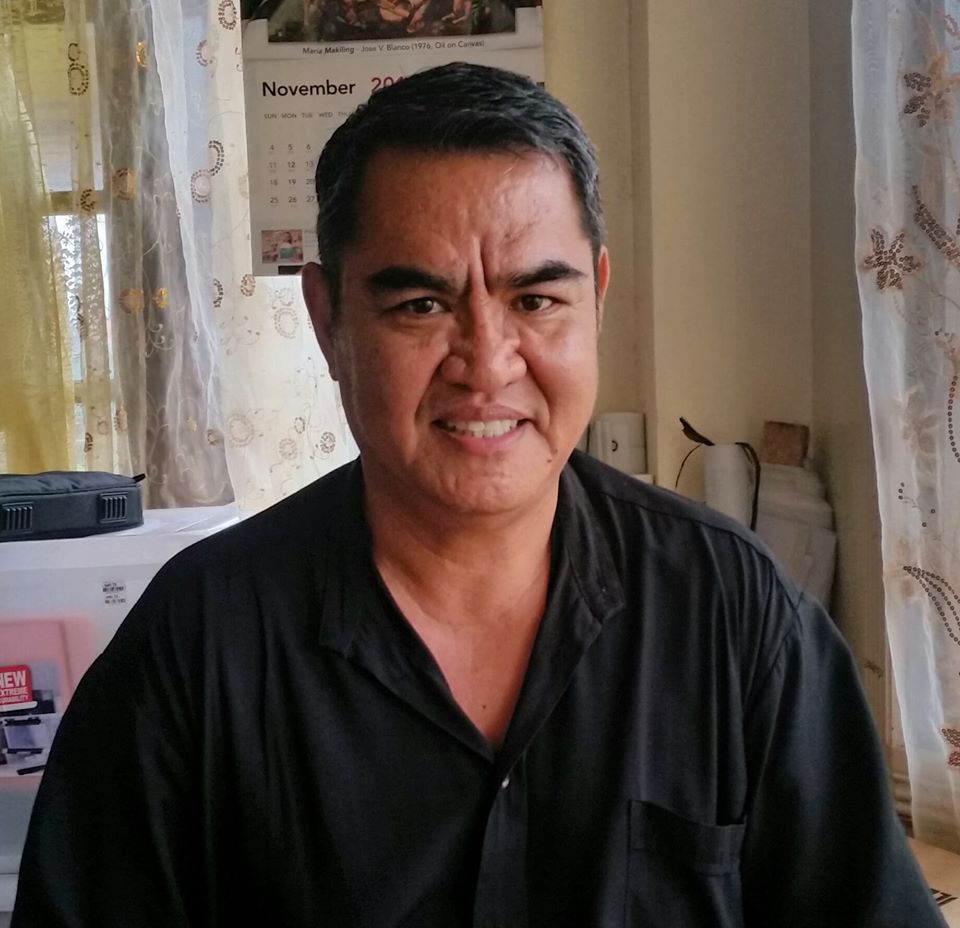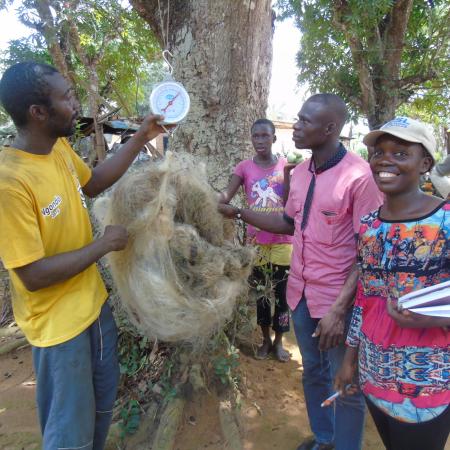
Net-Works (TM)
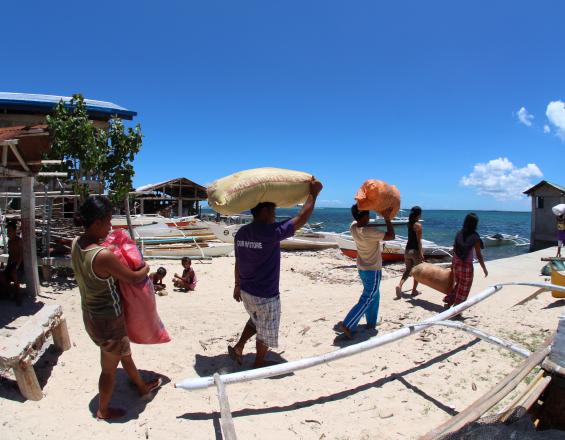
Net-Works es una iniciativa galardonada que rediseña las cadenas de suministro mundiales para reducir el plástico marino, reponer las poblaciones de peces en declive y mejorar la resiliencia socioecológica de las comunidades costeras marginadas que viven en puntos críticos de biodiversidad de los países en desarrollo. Ponemos en contacto a estas comunidades con marcas mundiales a través de un modelo empresarial justo e integrador que ofrece "menos plástico, más pescado". Un ejemplo es la creación de una cadena de suministro comunitaria para las redes de pesca desechadas en Filipinas y Camerún, que evita que se conviertan en redes fantasma. Las redes se reciclan en hilo de nailon que se utiliza para crear hermosas losetas de moqueta de alto diseño de Interface Inc. Net-Works fue creada conjuntamente por la Sociedad Zoológica de Londres (ZSL) y el fabricante de moquetas en losetas Interface Inc.
Contexto
Défis à relever
- El problema de las redes de pesca desechadas en algunas de las comunidades costeras más pobres, que causan contaminación marina y dañan la vida acuática, debido a la falta de un medio sostenible de eliminación.
- Sensibilizar y cambiar el comportamiento de la gente para que deje de tirar las redes usadas.
- La falta de acceso a servicios financieros dificulta el ahorro y el acceso a préstamos.
- La disminución de las poblaciones de peces, la excesiva dependencia de la pesca como fuente de ingresos y la necesidad de diversificar los medios de subsistencia.
Ubicación
Procesar
Resumen del proceso
Cada uno de estos elementos es interdependiente. Net-Works no habría sido posible sin la asociación adecuada: la mezcla perfecta de necesidad, experiencia y mentalidad que permitió a dos colaboradores improbables, ZSL e Interface, ser pioneros en un programa tan innovador. Los bancos comunitarios son la infraestructura social central de Net-Works: reúnen a la comunidad y son el mecanismo de organización y toma de decisiones de la comunidad. Los ingresos de las ventas netas pueden ahorrarse a través de los bancos comunitarios, y los fondos medioambientales son creados por los miembros de los bancos comunitarios para financiar proyectos locales de conservación. Por último, el éxito de la implicación de las comunidades locales depende de la estrecha colaboración con los socios locales, que aportan conocimientos y experiencia sobre el terreno.
Bloques de construcción
Modelo de negocio inclusivo vinculado a la conservación
Aplicando los principios del comercio justo y los negocios inclusivos, creamos cadenas de suministro eficientes basadas en la comunidad para materias primas (plásticos y algas carrageninas) que están disponibles en abundancia. Vinculamos estas materias primas a acciones de conservación que reducen la contaminación por plásticos y restauran los ecosistemas costeros. El aumento de los ingresos procedentes de estas materias primas reduce la dependencia de la pesca, lo que permite a las comunidades reservar zonas de veda más amplias para repoblar las poblaciones de peces.
Factores facilitadores
Una larga relación personal entre dos de los miembros fundadores de Net-Works, el Dr. Nick Hill (ZSL) y Miriam Turner (antigua Vicepresidenta Adjunta de Co-Innovación de Interface), sentó las bases adecuadas para forjar una sólida colaboración. Una visión compartida y el establecimiento de objetivos e hitos claramente definidos siguen contribuyendo a fortalecer el equipo.
Lección aprendida
Es importante que todos los socios implicados en el proyecto tengan una visión compartida de lo que quieren conseguir y un acuerdo claro sobre objetivos e hitos. La comunicación regular y continua entre los socios es clave.
Venta de materias primas en una cadena de suministro global
Vendemos las materias primas a cadenas de suministro mundiales, lo que brinda a las marcas internacionales la oportunidad de abastecerse de productos de primera calidad con historias sociales y medioambientales positivas, ofrece a las comunidades pesqueras un precio más transparente y fiable y proporciona fuentes de financiación sostenibles para las acciones locales de conservación y desarrollo. De este modo se garantiza la sostenibilidad de zonas marinas protegidas de múltiples hábitats más grandes y eficaces, y se pueden mantener controles y normas de calidad independientes de donantes externos.
Factores facilitadores
Los VSLA son un modelo sólido y probado en todo el mundo, dirigido por las propias comunidades. El equipo de Net-Works ofrece formación y tutoría a las comunidades sobre cómo crear y gestionar un VSLA. También imparten educación financiera a los miembros de las VSLA.
Lección aprendida
Las VSLA funcionan con mayor eficacia si se adhieren a la metodología probada, por lo que es importante seguir las directrices al pie de la letra y compartir lo aprendido entre las comunidades.
Infraestructura bancaria comunitaria
Para gestionar las cadenas de suministro locales, creamos bancos comunitarios que reúnen a las comunidades en cooperativas informales y les proporcionan un acceso muy necesario a los servicios financieros. Estos bancos comunitarios son el "pegamento social" en el corazón de Net-Works, ya que permiten a sus miembros invertir en sus medios de vida sostenibles, construyendo una circunscripción de conservación de Net-Works.
Factores facilitadores
Los ingresos suplementarios obtenidos de la venta de redes son un incentivo eficaz para que la población local participe en los Net-Works, junto con otros incentivos no financieros, como playas y costas más limpias y un medio marino más sano. También les permite completar los ingresos decrecientes de la pesca y acumular ahorros a través de los bancos comunitarios.
Lección aprendida
Es importante utilizar una combinación de incentivos financieros y no financieros cuando se intenta implicar a las comunidades locales y fomentar un cambio de comportamiento a largo plazo.
Fondos para el medio ambiente
Los miembros del banco comunitario aportan periódicamente una pequeña cantidad de dinero de las ventas netas a un Fondo Medioambiental específico, que se utiliza para ayudar a financiar proyectos locales de conservación, como la protección marina gestionada por la comunidad. El dinero recaudado a través del fondo puede utilizarse para obtener financiación adicional de la administración local o de ONG.
Factores facilitadores
En un principio, el equipo de Net-Works puso a prueba el concepto de Fondo para el Medio Ambiente con un pequeño número de comunidades. Cuando tuvo éxito, se extendió a otras comunidades, junto con asesoramiento y apoyo sobre cómo gestionarlo eficazmente. Las comunidades se sienten motivadas por el sentimiento de propiedad y autonomía que se deriva de recaudar dinero por sí mismas en lugar de depender de financiación externa.
Lección aprendida
En algunos casos, los Fondos Medioambientales pueden aprovecharse aún más si varias comunidades colaboran en el uso de los fondos. Es importante contar con miembros del equipo sobre el terreno que puedan facilitar este tipo de cooperación entre comunidades.
Asociaciones y colaboración intersectorial
Rediseñar las cadenas de suministro mundiales y ofrecer un modelo de negocio inclusivo vinculado a la conservación requiere un conjunto diverso de conocimientos que exige colaboración. Net-Works fue creada conjuntamente por la organización benéfica de conservación ZSL y el fabricante de moquetas Interface Inc. Para que Net-Works tenga éxito, es fundamental establecer asociaciones sólidas con las comunidades locales y las organizaciones locales asociadas. Las comunidades tienen que sentirse motivadas para participar y trabajar con socios locales que entiendan el contexto y las costumbres locales garantiza que la divulgación y el compromiso se hagan de la manera correcta.
Factores facilitadores
La ZSL llevaba muchos años trabajando en Filipinas y ya había establecido relaciones con organizaciones y comunidades locales. El éxito del proyecto piloto inicial de Net-Works, en el que participó un pequeño número de comunidades, contribuyó a motivar a otras comunidades a participar.
Lección aprendida
Forjar buenas relaciones con los socios locales y con los líderes de las comunidades locales es esencial cuando se intenta generar confianza y animar a las comunidades a adoptar una nueva iniciativa como Net-Works.
Impactos
Desde 2012, Net-Works ha recogido más de 167 toneladas métricas de redes de residuos. Al menos 1.500 familias han tenido acceso a financiación a través de los bancos comunitarios creados por Net-Works, y 62.000 personas se han beneficiado de un medio ambiente más saludable. Hasta la fecha, hemos establecido fondos medioambientales en 55 bancos comunitarios, con 1.217 miembros que aportan aproximadamente 2.925 dólares de sus ahorros directamente a acciones locales de conservación y gestión marina. A través de Net-Works estamos protegiendo 1.112,23 ha de hábitat acuático en 8 áreas protegidas comunitarias.
Beneficiarios
Los principales beneficiarios son las comunidades locales: pescadores y sus familias de 26 comunidades de Filipinas y 9 de Camerún. Otros beneficiarios son Aquafil (fabricante de hilo), Interface (fabricante de alfombras) y ZSL (organización benéfica de conservación).
Objetivos de Desarrollo Sostenible
Historia

Mia Apurado es la Directora de Operaciones Comerciales de Net-Works en Filipinas. Ha visto de primera mano cómo han cambiado las actitudes y comportamientos de las comunidades pesqueras en torno al descarte de redes gracias a Net-Works: "Se han dado cuenta de que, en lugar de tirar las redes al mar o a cualquier otro sitio, es algo con lo que pueden ganar dinero. Sus valores y actitudes han cambiado de verdad". Arcelene Baculao Murillo, miembro de la comunidad y encargada de la contabilidad de su banco comunitario local, afirma: "Hay mucha menos basura porque los miembros de la comunidad han estado participando, cooperando y ayudando a retirar las redes y la basura."
Fanny Djomkam es la coordinadora comunitaria de Net-Works en la región camerunesa del lago Ossa. Su función consiste en trabajar con las comunidades para crear bancos comunitarios gestionados localmente y actividades de recogida de redes. "Net-Works ha beneficiado a las comunidades locales de muchas maneras, pero para mí el mayor beneficio han sido los bancos comunitarios o VSLA, como los llamamos localmente. Los VSLA han contribuido realmente a fortalecer las comunidades de pescadores. Constituyen un mecanismo sencillo y eficaz que permite a los pescadores organizarse y gestionar sus ahorros de forma clara y responsable. Las VSLA han contribuido a que las comunidades se unan en un espíritu de cooperación allí donde antes había conflictos. Los comités de pescadores trabajan ahora con la administración local para cogestionar el lago y garantizar el cumplimiento del código de pesca. Es fantástico ver que se sienten tan empoderados".

